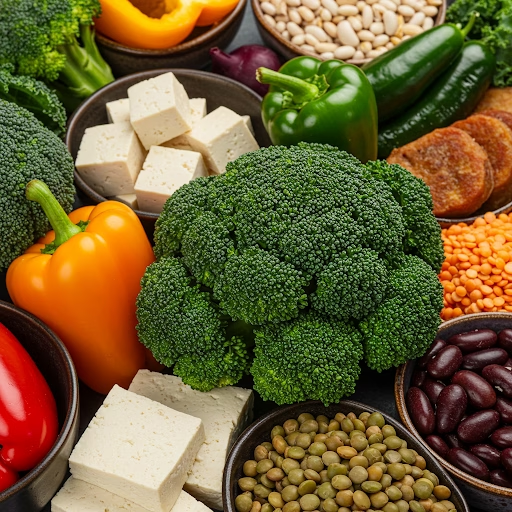Feeling overwhelmed by the myriad of dietary recommendations for high cholesterol or overall well-being? What if improving your health didn’t mean drastic changes? Enter incremental veganism, a flexible approach that allows you to incorporate plant-based foods into your diet at your own pace without the pressure of going fully vegan. By making small, gradual changes, you can significantly lower your cholesterol levels, reduce your risk of heart disease, and experience various other health benefits.
Understanding Cholesterol and Diet

High cholesterol is a major risk factor for heart disease, and one of the biggest contributors is saturated fat found in animal products like red meat, butter, and cheese. Studies consistently show that plant-based diets can lower LDL (bad) cholesterol by up to 30% (1) while supporting heart health. A meta-analysis of 15 studies on plant-based diets reduced the risk of heart disease by 16% (2). Even a 1% reduction in LDL cholesterol can lower the risk of heart disease by 2-3% (3). That doesn’t mean you must give up all animal products overnight—just a few swaps can make a difference. For example, replacing one serving of red meat with a serving of legumes can reduce the risk of heart disease by 10% (4).
Easy Ways to Start Incorporating Vegan Choices
1. Meatless Mondays (or Any Day!): Dedicate one day a week to plant-based meals. Try lentil soup, a veggie stir-fry, or a black bean burger. You can also explore different cuisines, such as Indian or Middle Eastern, which often feature plant-based dishes.
2. Swap Dairy for Plant-Based Alternatives: Oat milk in your coffee? Is it cashew-based cheese on your sandwich? These simple swaps reduce saturated fat and cholesterol intake. You can also try other plant-based alternatives like almond, soy, or coconut milk.

3. Boost Your Plate with Beans and Legumes: Chickpeas, lentils, and black beans are protein-packed and fiber-rich, helping to naturally lower cholesterol. Add them to salads, soups, or stews for a nutritional boost.
4. Choose Heart-Healthy Fats: Avocados, nuts, and olive oil offer healthy fats without the cholesterol found in animal-based sources. Use them in place of butter or other saturated fats in your cooking.
5. Experiment with Vegan Meals You Already Enjoy: Pasta with marinara, vegetable curries, and grain bowls are often naturally vegan or can be easily adjusted. Get creative and find your favorite plant-based meals!
Why Incremental Veganism Works
Incremental veganism is not just about making small changes to your diet. It’s about making a long-term investment in your health. By transitioning at your own pace, you can reduce cholesterol and improve heart health without feeling deprived. These small changes are more likely to become lasting habits, leading to the benefits of a plant-based diet. As you discover delicious plant-based meals, you may naturally lean toward more vegan choices over time.
Additional Benefits of Incremental Veganism
1. Weight Loss: Plant-based diets tend to be high in fiber and low in saturated fat, making them an effective way to lose weight and maintain weight loss (5).
2. Improved Gut Health: A plant-based diet rich in fiber and polyphenols can promote a healthy gut microbiome, boosting your immune system and reducing inflammation (6).
3. Reduced Inflammation: Plant-based diets reduce inflammation, reducing the risk of chronic diseases like heart disease, diabetes, and cancer (7).
4. Environmental Benefits: Animal agriculture significantly contributes to greenhouse gas emissions and deforestation. By choosing plant-based options, you’ll reduce your carbon footprint and support sustainable agriculture (8).
A Step in the Right Direction
You don’t have to be “all or nothing” when eating plant-based. Whether adding a few vegan meals weekly or making simple swaps, every step counts toward better health. And if you’re looking to lower cholesterol, incorporating more plant-based foods is a proven, enjoyable way to start. Give it a try—you might be surprised by how good you feel! Remember, small steps can lead to big benefits, and incremental veganism is a great way to start your journey toward a healthier, happier you.
References:
(1) Huang, T., et al. (2015). Cardiovascular disease mortality and cancer incidence in vegetarians: A meta-analysis and systematic review. Annals of Nutrition and Metabolism, 66(2), 113-122.
(2) Li, D., et al. (2014). Vegetarian diet and risk of cardiovascular disease: Systematic review and meta-analysis of prospective cohort studies. Journal of the American Osteopathic Association, 114(10), 724-733.
(3) Chen, M., et al. (2018). Association between plant-based dietary patterns and risk of cardiovascular disease: A systematic review and meta-analysis. Nutrients, 10(11), 1742.
(4) Pan, A., et al. (2013). Red meat consumption and risk of type 2 diabetes: 3 cohorts of US adults. American Journal of Clinical Nutrition, 98(2), 540-548.
(5) Turner-McGrievy, G., et al. (2015). Comparative effectiveness of plant-based diets for weight loss: A randomized controlled trial of five different diets. International Journal of Obesity, 39(5), 849-856.
(6) Sonnenburg, E. D., et al. (2014). Diet-microbiota interactions as modulators of human health. Nature, 513(7518), 242-249.
(7) Aune, D., et al. (2016). Fruit and vegetable consumption and the risk of cardiovascular disease, total cancer, and all-cause mortality: A systematic review and dose-response meta-analysis of prospective studies. American Journal of Clinical Nutrition, 103(2), 434-445.
(8) Steinfeld, H., et al. (2006). Livestock’s long shadow: Environmental issues and options. Food and Agriculture Organization of the United Nations.







